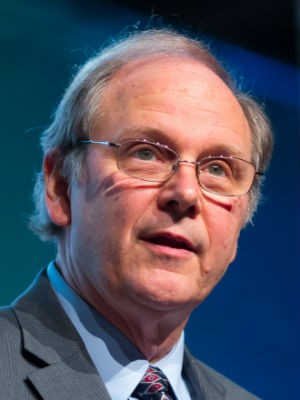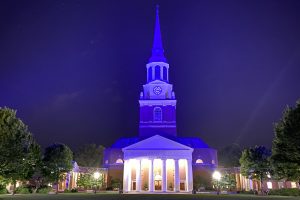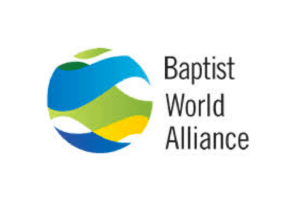 “The apple doesn’t fall far from the tree” is a common aphorism with a hazy origin but clear meaning. The metaphor describes a child who exhibits traits that are like those of one or both parents. While each of us inherits certain characteristics from our mother or father, sometimes the similarities are so striking as to elicit this comment from observers.
“The apple doesn’t fall far from the tree” is a common aphorism with a hazy origin but clear meaning. The metaphor describes a child who exhibits traits that are like those of one or both parents. While each of us inherits certain characteristics from our mother or father, sometimes the similarities are so striking as to elicit this comment from observers.
The opposite is also true. Sometimes it is the conspicuous differences between parent and child that make an impression on observers. Such is the case with how I view Franklin Graham and his father, the beloved pastor to the world, Billy Graham.
I never had a personal relationship with either the son or the father, although during the summer of 1964 I spent time with both of them. I was an 18-year-old staff member at a boys’ camp in Black Mountain, North Carolina, where Franklin was an 11-year-old camper in the same large tribal unit in which I was a cabin counselor. One afternoon he asked if I would drive him home so he could get his baseball glove. I quickly agreed, hardly believing I could possibly meet his famous father.
Excitedly enticing another young counselor to ride along, we three were soon driving up the rhododendron-lined, private road above Montreat that led to the Grahams’ beautiful log house. Two large German Shepherds rushed forward to stand on hind legs, each peering into one of the front windows of my car, while Franklin ran inside to retrieve his glove. When he returned, I didn’t restart the engine and asked, hopefully, “Are your parents at home?”
“Oh, alright! Come and meet them!” he said, not hiding the irritation he felt about people disrupting his own plans by wanting to meet his parents.
Ruth Graham was gracious and warm, welcoming a couple of curious young strangers to her kitchen, serving us a snack as we waited on her husband. We could hear “the voice” in another room on a prolonged phone call. I can’t recall what Franklin was doing, although I’m sure he was antsy to return to camp. But as a PK (preacher’s kid) myself, and an entering college freshman, I was excited to meet someone who was an international celebrity, a friend of presidents and the Queen, a role model for Baptists like myself and millions of other Christians, and someone who had repeatedly been chosen as “one of the most admired persons” in America.
“Many in the global Christian community who, like me, respected Billy Graham in an earlier era have lost all respect for his son.”
After 15 or 20 minutes, Billy came into the kitchen, friendly and genuinely interested in who we were. He apologized for not getting to us more quickly, explaining he had been on the phone with Senator Barry Goldwater of Arizona. It was the summer before the presidential election between Goldwater and Lyndon Johnson, so the Republican candidate had called Graham to talk about his platform and try to garner his support.
The political import of that phone call, and the prominence it attributed to Graham personally, were quickly set aside as the world-renowned evangelist asked about us – our families, schools, aspirations and faith. When we left the house that afternoon, we couldn’t believe our good fortune, nor the fact that Billy Graham had given two teenagers so much of his valuable time. Looking back today, I am impressed by the fact that, while we were clearly star-struck by meeting him, Graham made no effort to impress us with his popularity and influence or to sway us politically.
Of the dozens of books written about him, I have found The Legacy of Billy Graham: Critical Reflections on America’s Greatest Evangelist (2008) especially helpful. Edited by Michael Long, the book concludes with a discussion of Graham’s lasting imprint written by distinguished Harvard theologian Harvey Cox. Cox, who first met Graham about two years before I did, provided critical evaluation of the celebrated evangelist numerous times over the subsequent decades.
Of all the personas he might have chosen to summarize the North Carolina Youth for Christ preacher-turned-global phenomenon, Cox chose three: Graham as ecumenist, prophet and peacemaker. Today, I see these same categories as useful ways of explaining how far Franklin Graham has fallen from the tree.
The Grahams and ecumenism
While the elder Graham was unapologetically evangelical, he nonetheless was ecumenical. He attended international gatherings of the World Council of Churches in Amsterdam and New Delhi as an observer, reporting that he was “thrilled at the whole process of seeing world churchmen sitting down together, praying together, discussing together.” Not only did he choose to engage in crusade preparations with Mainline Protestants and Roman Catholics, but also with Pentecostals – an anathema to Fundamentalist (and thus exclusivist) critics like Bob Jones, John R. Rice and Carl McIntire.
The importance of Graham’s ecumenical working partnerships was never more evident than in the 1981 Houston Crusade that formed an impressive alliance of racially and denominationally different Christian leaders. In Billy Graham: American Pilgrim (2017), Darren Dochuk, professor of history at the University of Notre Dame, notes:
“Chastened by Nixon’s failed presidency, and disheartened by the fundamentalism of Jerry Falwell’s Moral Majority, Graham arrived in Houston promising to avoid politicking of any kind. . . . Most of all, though, Graham’s 1981 event revealed his desire to promote a discourse of diversity beyond black-white lines, a race-and-ethnic-neutral ecumenical evangelicalism as the heartbeat of the present church, and a charitable as well as enterprising spirit as the hope of the church’s future.”
The younger Graham, on the other hand, is an evangelical who over the years has increasingly distanced himself from the ecumenical spirit of his father.
“To turn ‘The Hour of Decision’ into a thinly-veiled promotion for President Donald Trump (or any political candidate) betrays the passionate, singular cause that Billy Graham espoused in more than 400 crusades in 185 countries.”
As David French, senior writer for National Review, has asserted, Franklin Graham’s harsh rhetoric and narrow political associations illustrate the declining significance of the evangelical witness in the public square. Many in the global Christian community who, like me, respected Billy Graham in an earlier era have lost all respect for his son.
Stephen Prothero, religion professor at Boston University, agrees that Franklin has diminished the Graham name. His essay in Politico Magazine concludes:
“The qualities of temper and judgment that made Billy Graham so singularly successful are almost entirely lacking in his son, who now imperils his father’s legacy. . . . [He] seems blissfully unaware of the possibility that there might be even the slimmest of gaps between the words that come out of his mouth and the words written down in scripture. . . . Thanks to Franklin Graham and his cronies on the Religious Right, American evangelicalism has now become first and foremost a political rather than a spiritual enterprise.”
This political partisanship is abundantly clear in Franklin Graham’s follow-up to his controversial 50-state Decision America tour in 2016. The announcement that he is bringing his 2019 version of Decision America home to North Carolina in October has been met with mixed reviews. Jonathan Wilson-Hartgrove, board member of Repairers of the Breach, a Christian social justice organization which stresses that the choices we must make are not between left and right but between right and wrong, stated:
“I can’t support the Graham crusade. For years now, he has twisted the gospel I love into an endorsement of extreme policies that hurt immigrants, Muslims, the LGBGTQ community, and poor and low-income neighbors.”
To turn “The Hour of Decision” into a thinly-veiled promotion for President Donald Trump (or any political candidate) betrays the passionate, singular cause that Billy Graham espoused in more than 400 crusades in 185 countries.
The Grahams and prophetic witness
Billy Graham liked to remind his detractors that he was an evangelist and not a prophet. Yet, despite the fact that he failed sometimes to speak up when he might have – during the anti-Vietnam War protests, for example – Graham did act prophetically. Not only did he cooperate with the “liberal” wing of the Christian Church, but in a message at Harvard Memorial Church in Cambridge in 1982 he urged the abolition of all nuclear weapons, including America’s.
It was, however, his participation in anti-poverty and anti-segregation efforts where Graham reflected Old Testament prophets like Amos. In Billy Graham, American Pilgrim, David King, professor of philanthropic studies at Indiana University, explains that at Graham’s last major crusade in New York in 2005 – held near the site of the 9/11 attack just four years earlier – he did not point to the dangers of Islam as the most pressing global problem; instead, he cited worldwide poverty. A commitment to this social justice message had grown throughout Graham’s ministry, as King chronicles:
“Constant exposure to ever-widening contexts led him to use his public platform to speak out on certain issues: advocating U.S. foreign aid to fight the early Cold War, lending support for a time to the War on Poverty at home, and later publicizing the United Nations’ efforts to eliminate global hunger amid war and disease.”
Graham could also be prophetic on racial issues. As a child of the South, he was slow to integrate his meetings, but by 1953 in Chattanooga, Graham told meeting organizers that there would be no “colored seating section” in the stadium, a bold stance for the evangelist. Then, during the height of the Civil Rights Movement, he added African Americans to his staff, frequently featured Ethel Waters singing “His Eye is on the Sparrow” just before he preached, and invited Martin Luther King to join him on stage for his 1957 Madison Square Garden Crusade.
In stark contrast, Franklin Graham has misconstrued his role as God’s prophet.
“It was . . . his participation in anti-poverty and anti-segregation efforts where (Billy) Graham reflected Old Testament prophets like Amos. . . . In stark contrast, Franklin Graham has misconstrued his role as God’s prophet.”
Pulitzer Prize-winning journalist Eliza Griswold identifies several of Franklin’s disturbing utterances, one of which relates to the Black Lives Matter movement. Countering the public outcry about police violence toward people of color, Franklin authored a strikingly odd open letter that completely missed the mark, stating: “Listen up – Blacks, Whites, Latinos and everybody else. Most police shootings can be avoided. It comes down to respect for authority and obedience.”
Responding to the younger Graham’s exclusivist attitude toward immigrants, Baptist minister Mark Wingfield noted in a 2017 column for Baptist News Global that “the son of America’s most famous evangelist last week rushed to the defense of Donald Trump, saying the president’s hardline ban on immigration was just fine because it is ‘not a biblical issue.’” Like Wingfield, I find Graham’s xenophobic rhetoric to be either uninformed or blatantly false in light of explicit biblical admonitions such as Zechariah 19:34: “You shall treat the stranger who sojourns with you as the native among you, and you shall love him as yourself, for you were strangers in the land of Egypt.”
More recently, Graham has added another un-prophetic pronouncement to his polarizing message. He has repeatedly questioned Mayor Pete Buttigieg’s right to self-disclose as a “gay Christian” and has tried to lure the 2020 Democrat presidential candidate into a Twitter debate. Buttigieg, who has been more open about his faith than any other 2020 candidate for president, has not taken the bait, although he has publicly criticized Vice President Mike Pence’s homophobia, which Graham is echoing. In a speech in April to the LGBTQ Victory Fund, Buttigieg declared, “I wish the Mike Pences of the world would understand, that if you have a problem with who I am, your quarrel is not with me. Your quarrel, sir, is with my creator.”
To be clear, Graham’s positions on issues such as police brutality against African American persons, especially black men; immigration justice; and LGBTQ persons and gay rights also mirror the views of President Trump. And that connection may be the greatest hindrance to Franklin’s prophetic witness. Praying at the 2016 presidential inauguration, Graham declared that the rain in Washington that day was a sign of God’s blessing on the new administration. He then quoted a prayer from 1 Timothy: “For kings and for all those in authority, that we may live peaceful and quiet lives in all godliness and holiness.”
The Grahams and peacemaking
Graham the father became a defender of peace, illustrated by his courageous decision to visit Russia at the height of the Cold War. Despite pressure from the State Department to change his plans, Graham persisted, stopping on the way to preach in East Germany, where, according to Cox, “he met the Communist leader Erich Honecker and told him he prayed for both sides to end the East-West confrontation and to rid themselves of nuclear weapons.”
The one-time alarmist who preached against godless communism had grown to practice peacemaking, willing and even eager to build friendships with those who held different views.
Thus, in many parts of the globe Billy Graham could be found not only preaching to thousands but engaging thoughtfully (and sometimes privately) with individual politicians, academics, community leaders and clergy. In this way, as Cox suggests, Graham became for many “the embodiment of the Christian gospel, and – almost inevitably – of peace.”
Graham the son has evidenced no such penchant for peacemaking. He is particularly virulent about Islam, which after 9/11 he called “an evil and wicked religion.” In a national television interview, he remarked, “It wasn’t Methodists flying into those buildings, and it wasn’t Lutherans. It was an attack on this country by people of the Islamic faith.” In another interview in 2009, he opined: “[T]rue Islam cannot be practiced in this country. You can’t beat your wife. You cannot murder your children if you think they’ve committed adultery or something like that.”
This repugnant slander of the religion of a billion-and-a-half Muslims was one of the reasons that in 2016 an ecumenical group of Christians rejected plans for a Franklin Graham crusade in a major Canadian city.
“Graham the son has evidenced no such penchant for peacemaking. He is particularly virulent about Islam.”
Vancouver City Councillor Tim Stevenson cited concerns for safety, noting, “The kind of statements Graham makes about Muslims and gays can really inflame the situation.” Echoing the concerns of other clergy, two Canadian Baptist pastors declared in a statement: “Given that the express goal of this event is evangelism, with the commitment of new believers to Christ, we do not believe that Rev. Graham, with his expressed broader belief system, should be the exemplar that impresses itself upon these new believers.”
More recently, the Muslim Council of Britain lobbied Parliament to exercise its powers to deny a visa to Graham, citing a precedence for banning persons “not conducive to the public good.” A World Religion News story noted that such concerns have been raised because “Graham’s hateful remarks are on record and they clearly show hatred against Muslims along with a number of other minorities.”
It has been 55 years since that summer in North Carolina when I met Billy and Franklin Graham. Both of them, like me and everyone else, should be understood as a mixture of good and less than good (even bad) traits. The father accomplished so much as a global evangelist, but he also had failings. Some of these were acknowledged more openly than others, but a humility of spirit was one of the elder Graham’s consistent, hallmark qualities.
Franklin Graham also has exhibited public shortcomings, although apparently he did not inherit his father’s humility gene. He too has accomplished good work, most notably through Samaritan’s Purse, the North Carolina-based charitable organization he has led since 1979. The 2018 budget for the evangelical, humanitarian aid organization was $665 million.
Yet, as I see it, Franklin Graham is far from the man his father was. In conspicuous ways, he is still the angry, impatient and entitled 11-year-old I met in the summer of 1964. He is the proverbial apple who fell far from the tree.
Undoubtedly, this assessment of father and son will meet mixed reviews. Some will react negatively, believing I have dishonored the character of a respected, evangelical leader. Others may see this evaluation as an affirmation of opinions they have held for a long time.
Regardless of our particular political and theological persuasions, what is the lesson for me and for all of us as people of faith? It is this: We who claim to be children of a “Heavenly Father” might do well to think about the trajectory of our own lives. How far from the example of Jesus, the “human face of God,” have we wandered?
When we look at the presence, or absence, of spiritual “fruit” in our life stories, could it be said that we too have fallen far from the tree?






































































